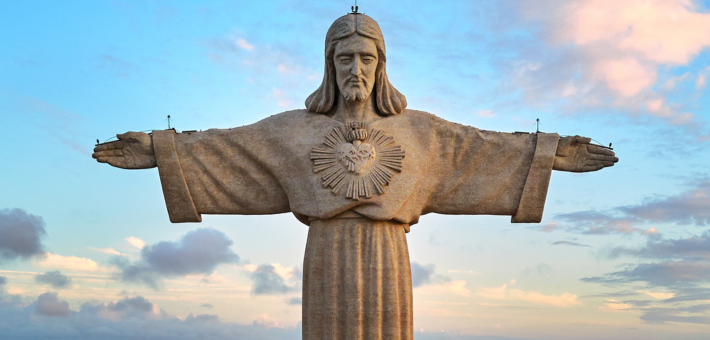Commentary on Luke 23:33-43
Juxtaposition of this text and Christ the King Sunday is a crucial one for the Christian faith. Each one informs the other: The scene on the cross gives shape to what Christ’s reign really looks like in humility and sacrifice, while highlighting the power Jesus shows during his own death by extending mercy to those hanging with him.
The tension between these two is felt differently at various points in history as the Christian faith has expressed itself in a wide variety of power contexts. Preachers will know which elements of the story speak powerfully to their people, but potential points of emphasis in our current shared context might include:
- the role of relationship in Jesus’ reign or power,
- the expectation of extending grace to those around us, even when it is difficult, and
- the contrast between the world elevating power and prestige and the story of Jesus elevating mercy and self-sacrifice.
Power in relationship
The setting of the interaction between Jesus and the other two men signifies the gravity of the moment. Jesus, the innocent one, is placed among those deemed guilty. Those around Jesus, including one of the criminals, mock him, emphasizing his rejection and humiliation. Jesus suffers in public while people watch, something most of us resist with all of our might, retreating to the safety of solitude to experience our deepest struggles.
Despite the setting of vulnerability, rejection, and physical pain, Jesus uses his power to intercede on behalf of others, first in verse 34 and again in verse 43. Jesus’ instinct to reach out to those who are at the very end—of life, of their rope, of their ability to care or to function—emphasizes that no one is beyond the reach of God’s mercy, and that the cross is the means to making the connection. Relationship is at the core of this kingdom.
For many people, these recent months and years have been marked not by relationships but by fracture and isolation, sometimes out of frustration, other times out of fear. What does it look like to prioritize relationships in our current context—nurturing healthy ones; grieving damaged ones, repairing them when it is possible, creating new ones when it is not; reaching out to those who are at the very end?
Unmerited grace
Remarkably, it is in this moment of humiliation and connection that Jesus embodies the ultimate act of love and forgiveness. Using his power to grant mercy to others, even those actively hurting him, underscores how deeply grace is indicative of the reign of Christ. And it compels those who follow Jesus to take this call seriously in their own lives and relationships.
Recognizing that Christ’s reign brings not only personal salvation but also a call to work on behalf of the common good of our neighbors, preachers can guide communities to ask themselves the hard questions.
How do we respond to the King who reigns from the cross?
Are we ready to extend grace to those around us, even when it is difficult?
What if they actively work against our best interests?
Are we willing to embrace the radical love that Jesus exemplifies?
Honesty with these questions will mean seeing ourselves in an unflattering mirror. Our resistance to these questions signifies our limitations and our need for Jesus’ forgiveness. We begin to see that it is only God’s action that can move us to acts of true selflessness, participating in the reign of Christ. The recognition of this power reflects the realization of the man crucified near Jesus who asks to be remembered and is comforted.
Elevation
The lofty language of kingdom and reign naturally lends itself to the ideas of elevation and being “lifted up.” Indeed, the image of Christ as King is intended to emphasize the sovereignty of Christ over all creation, including earthly leaders who pretend to wield ultimate authority. Such power in the hands of humans often leads to corruption and injustice. But power placed with Jesus produces a reign of mercy and justice. Watching Jesus transforms our understanding of power and authority. Jesus, lifted up on the cross, reveals that true power lies in self-giving love.
No longer beholden to what the world lifts up, those who witness Christ’s elevation in the preached Word of God are freed from the hierarchies and pressures of this world, transforming their understanding of power and authority. Participation in the Reign of Christ means freedom to speak on behalf of the marginalized, call out injustice, and advocate for those left behind by those in power. It is the end of the liturgical year. What else might God’s kingdom bring to an end to make room for something new?


November 23, 2025